|
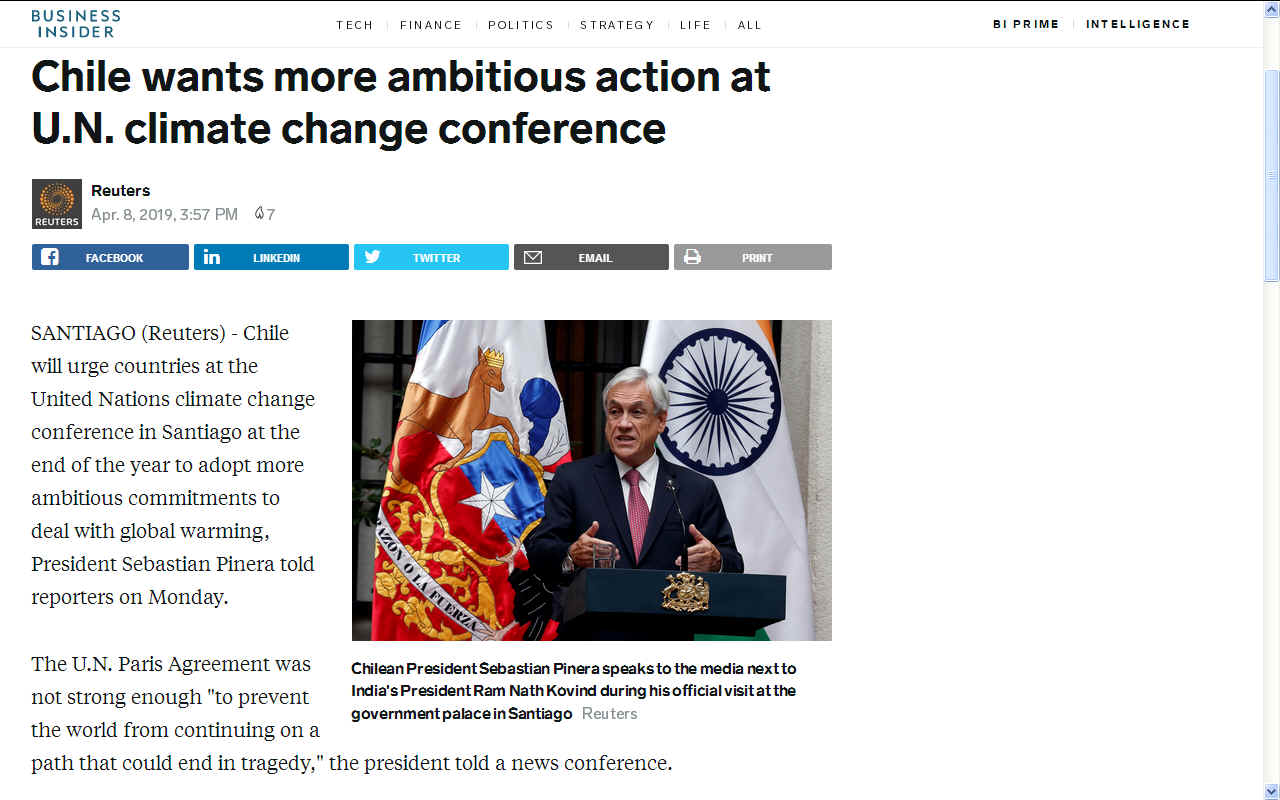
SANTIAGO
- PLEASE NOTE THAT THIS CONFERENCE HAS MOVED TO MADRID,
SPAIN DUE TO DOMESTIC ISSUES IN CHILE. OUR THOUGHTS ARE WITH ALL THOSE
IN CHILE AT A DIFFICULT TIME.
One cannot blame anyone for wanting more urgent action to combat the
rising temperature of planet
earth. Let us hope that with so much riding on
the decision of this conference that the member states can agree on a
formula that will start to reverse the current charge to extinction. Bids
for hosting the 2020 event have been in the offing since the beginning of
the year with the UK the only country in the world to have enacted statute,
that perhaps others might decide to emulate as part of the Paris Agreement.
It is clear from such moves that the Party Members are hoping to work the a
catapult that COP25 promises to be. You may care to agree when you see their
Vision and Initiatives.
The
Chilean COP25 team for 2019 is led by the Environment Minister, Carolina Schmidt, who will assume the Presidency of COP25, and will work with the collaboration of the Ministry of Environment, the Ministry of Foreign Affairs, the Ministry of Science, Technology, Knowledge and Innovation, and Fundación Imagen de Chile.
Each one of the members of the team are fundamental pieces for the successful development of the Conference, which will also have the collaboration from the COP25 Presidency Coordinator, Andrés
Landerretche, the content Coordinator, Rodrigo Olsen and the Coordinator of the event, Cristián Varela with their respective teams. Fundación Imagen de Chile organizes and executes the COP25.
A key figure at this summit is the COP Champion Gonzalo Muñoz, TriCiclos Co-founder and CEO, South America’s first certified B Corporation.
In addition, the President of the Republic of Chile, Sebastián Piñera E., ordered the creation of a COP25 Presidential Advisory Council that represents the civil society and its diverse interests.Team that will work hand in hand with President Sebastián Piñera includes an Executive Committee made up of the Presidency, the Ministry of Environment, the Ministry of Foreign Affairs, the Ministry of Science, the Ministry of Finance, Imagen Chile, the Communications Department (SECOM) and three Coordinators.
This first part of the team will work closely with the COP25 President, the Environment Minister Carolina Schmidt, who in turn will have assistance from:
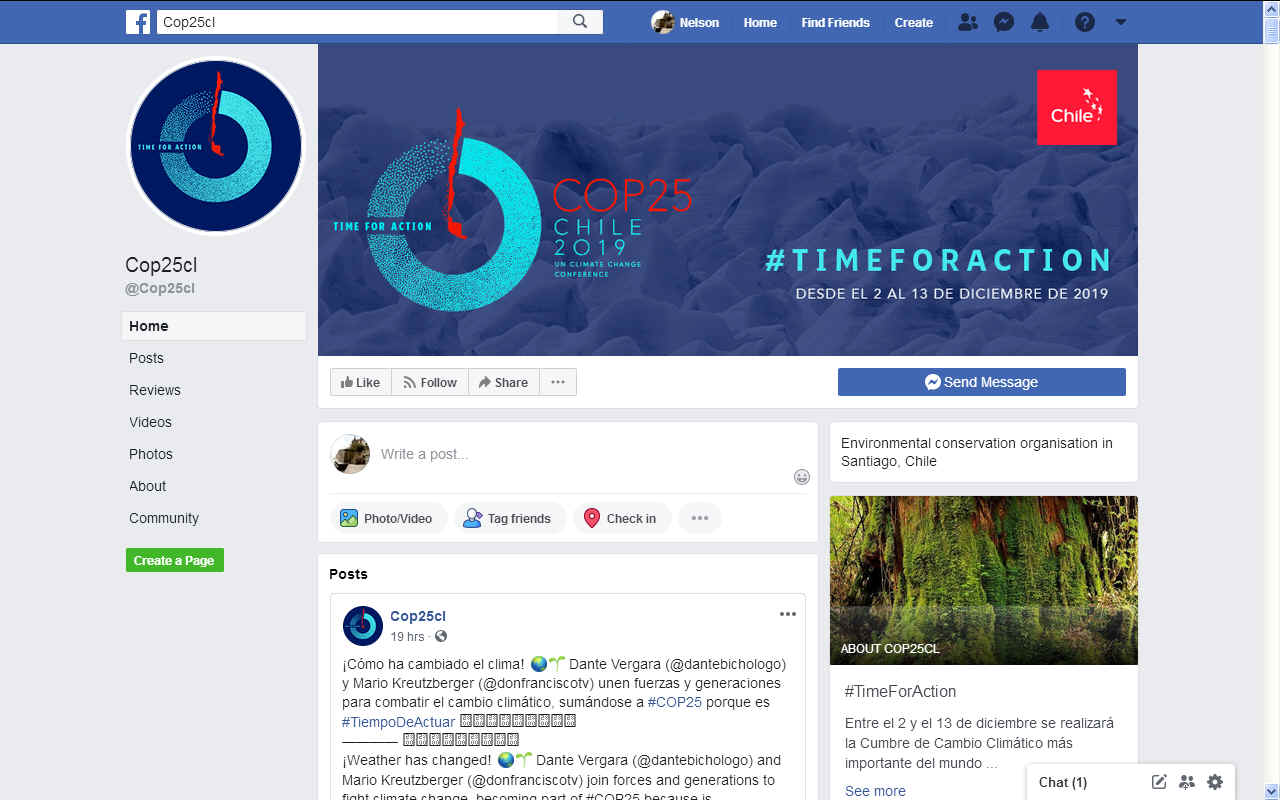
COP25 COUNCIL
The
COP25 Presidential Council made up of His Excellency the President of the Republic Sebastián Piñera E., Carolina Schmidt, Ministra del Medio Ambiente
(Presidenta COP25); Juan Carlos Jobet, Ministro de Energía; Teodoro Rivera, Ministro de
RR.EE.; Andrés Couve, Ministro de Ciencia, Tecnología, Conocimiento e Innovación; Ricardo Lagos, Ex Presidente de la República; Eduardo
Frei, Ex Presidente de la República; Guido Girardi, Presidente Comisión Medio Ambiente
Senado; Catalina Pérez, Presidenta de la Comisión Medio Ambiente Cámara; Jorge Bermúdez, Contralor general de la República; Karla
Rubilar, Intendenta de Santiago; Pablo Badenier, Ex Ministro del Medio
Ambiente; Germán Codina, Alcalde de Puente Alto; Arturo Aguirre, Alcalde de
Cerrillos; Gonzalo Durán, Alcalde de Independencia; Felipe Alessandri, Alcalde de Santiago; Mónica
Zalaquett, Subsecretaria de Turismo; Sebastián Sichel, Vice Presidente Ejecutivo de
Corfo; Jordan Harris, Red de Municipios Contra el Cambio Climático; Maisa Rojas, Científica, Directora Centro de Ciencia del Clima y la Resiliencia (CR2); Alfonso
Swett, Presidente CPC, Imagen Chile; Constanza Cea, Directora Ejecutiva de Imagen de Chile; Chantal
Signorio, Fundadora y Directora Puerto Ideas; Jonathan Hertzfeld, Creador y CEO de
fiiS, Imagen de Chile; Leonardo Maldonado, Gerente General Ciudades + B; Ricardo
Bosshard, Director WWF Chile; Maximiliano Bello, Oficial principal de la unidad de conservación de The Pew Charitable Trusts; Flavia
Liberona, Directora ejecutiva Fundación Terram; Andrés Antivil, Corporación Lonko
Kilapang; Andrea Rudnick, ex Jefa Oficina Cambio Climático, Ministerio Medio
Ambiente; Alejandro Ruiz, Ministro Titular del Tribunal Ambiental de Santiago; David Sandoval,
Senador, Comisión Medio Ambiente Senado; Sebastián Torrealba, Diputado, Comisión Medio Ambiente de la Cámara; Sebastián Álvarez,
Diputado, Comisión Medio Ambiente de la Cámara; Sebastián Vicuña, Director del Centro de Cambio Global
UC; Mónica Retamal, Imagen de Chile; Álvaro Fischer, Imagen de Chile; Claudio
Seebach, presidente Asociación Generadores de Chile; Giovanni Calderón, Director Ejecutivo de la Agencia de Sustentabilidad y Cambio Climático
(ASCC).
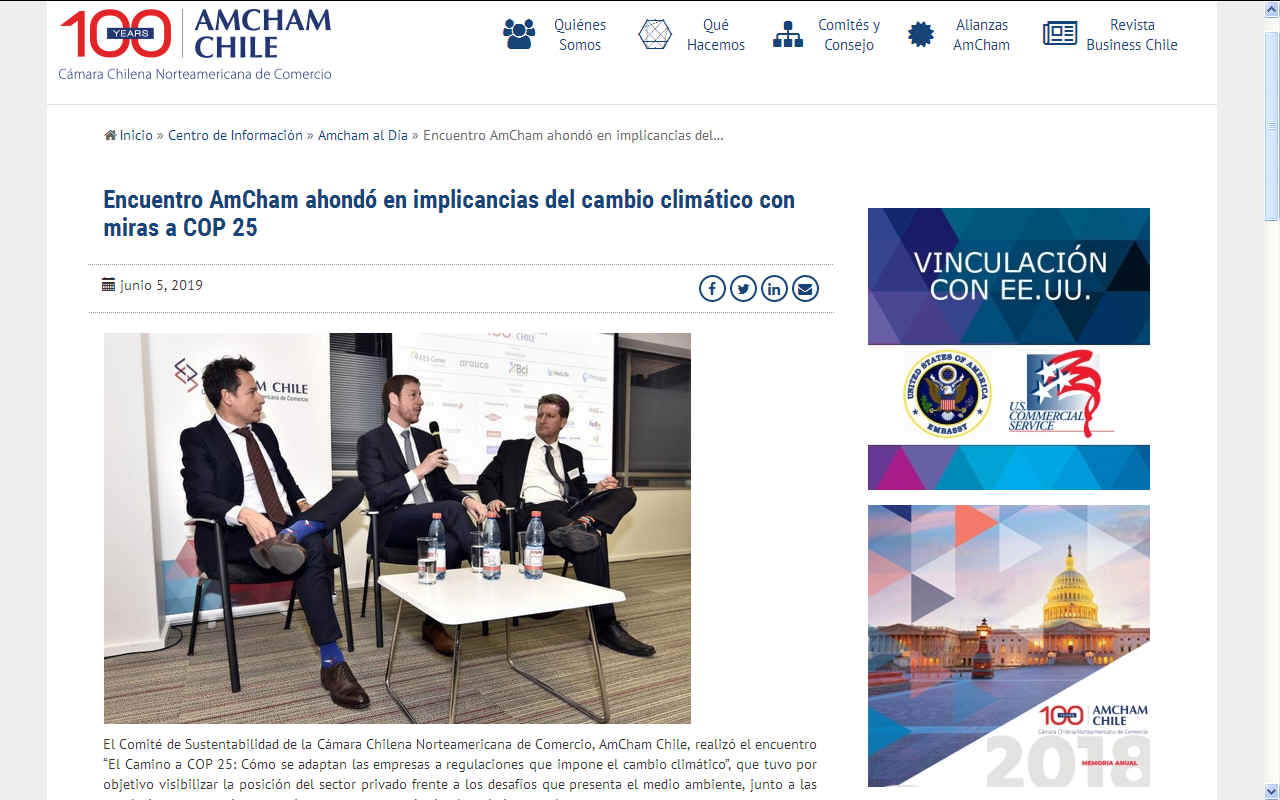
AMCHAM
CHILE
- El Comité de Sustentabilidad de la Cámara Chilena Norteamericana de Comercio, AmCham Chile, realizó el encuentro “El Camino a COP 25: Cómo se adaptan las empresas a regulaciones que impone el cambio climático”, que tuvo por objetivo visibilizar la posición del sector privado frente a los desafíos que presenta el medio ambiente, junto a las regulaciones necesarias para migrar a una economía circular y baja en carbono.
Lo anterior, a través del potenciamiento y el trabajo conjunto entre el mundo público, privado y la academia en torno a apoyar soluciones que mitiguen los efectos del cambio climático, teniendo en consideración que el desarrollo y el cuidado del medio ambiente van de la mano.
El encuentro comenzó con la presentación de Michael Burger, director ejecutivo Sabin Center for Climate Change Law en la Universidad de Columbia, quien entregó un panorama general de los desafíos que enfrentan los países en materia medioambiental. “Una de las principales tareas hoy en día es la descarbonización de los procesos actuales y esto ofrece grandes oportunidades en áreas como las energías renovables, la eficiencia energética y los mercados de energías alternativas”.
Por su parte Rodrigo Olsen, Coordinador de Contenidos COP25, entregó en su presentación algunos insights de la realización de la próxima cumbre del cambio climático, COP 25, que se realizará en Santiago entre el 2 y 13 de diciembre próximos. “Estamos trabajando en tópicos de interés, entre ellos la protección de océanos, glaciares, biodiversidad, energías renovables y economía circular, siempre con el propósito de acelerar el desarrollo y unir al sector privado con el gobierno, la comunidad científica y el resto de los actores involucrados”, expresó.
Kathleen Barclay, líder del Comité de Sustentabilidad de AmCham, destacó la realización del encuentro en dar a conocer a los socios de la Cámara los avances que se están llevando a cabo como parte de los preparativos de COP 25 y anunció que durante el segundo semestre, la agenda continuará con actividades de este tipo.
Cabe mencionar que COP 25 es una de las líneas de trabajo de AmCham para 2019, así como APEC 2019 y el aniversario de los 15 años del TLC con Estados Unidos.
The Sustainability Committee of the Chilean American Chamber of Commerce, AmCham Chile, held the meeting "The Road to COP 25: How companies adapt to regulations imposed by climate change", which aimed to highlight the position of the private sector in front of to the challenges presented by the environment, together with the regulations necessary to migrate to a circular and low
carbon economy.
The above, through empowerment and joint work between the public, private and academic world around supporting solutions that mitigate the effects of climate change, taking into account that the development and care of the environment go hand in hand.
The meeting began with a presentation by Michael Burger, executive director of the Sabin Center for Climate Change Law at Columbia University, who gave an overview of the environmental challenges facing countries. "One of the main tasks today is the decarbonisation of current processes and this offers great opportunities in areas such as renewable energy, energy efficiency and
alternative energy markets." 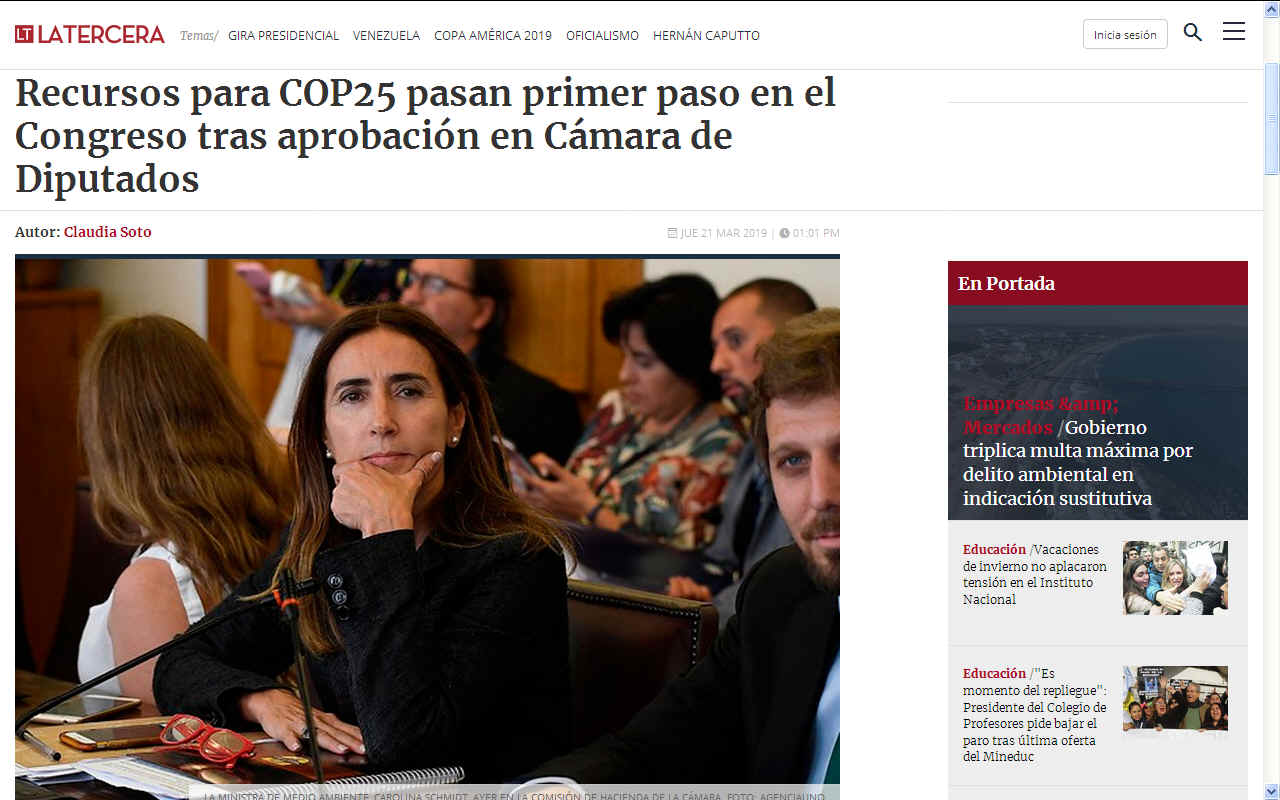
MARCH
21 2019
- The Minister of the Environment, Carolina Schmidt, said that the holding of the Conference of the Parties in Chile is an economic and logistical challenge, but that "it will be worth it, because Chile is one of the most vulnerable countries
to climate change".
After yesterday passed the test in the Environment and Finance Commissions, today the Chamber of Deputies approved
- with 117 votes in favor and two abstentions- the resources requested by the government to finance the Conference of the Parties 25 ( COP25) to be held in Chile next December. The initiative was sent to the Senate.
The figure, amounting to US $ 35 million, will be used to finance part of the international summit for climate change. But in addition, international contributions and private organizations will be received.
This is why parliamentarians requested that from the private sector, the resources do not come from companies that are questioned about their protection of the environment.
In today's session, the Environment Minister, Carolina Schmidt, who was present during the debate, said that, "undoubtedly, hosting the COP25, the most important event in the world, is a tremendous challenge. An economic challenge, a logistical challenge, but above all, it is a great challenge of convening and unity to generate consensus that will allow us to advance with more ambition in a fight against climate change. It is a major challenge, but it is a worthwhile challenge, because Chile is one of the countries most vulnerable to climate change. "
Thus, he pointed out that it is something "imperative" to address the issue of global warming. In that sense, he assured that the conference is a "unique opportunity" that will serve to "generate awareness".
The Secretary of State said that for this, it is necessary to involve all sectors: citizens, scientific world, private sector and the State.
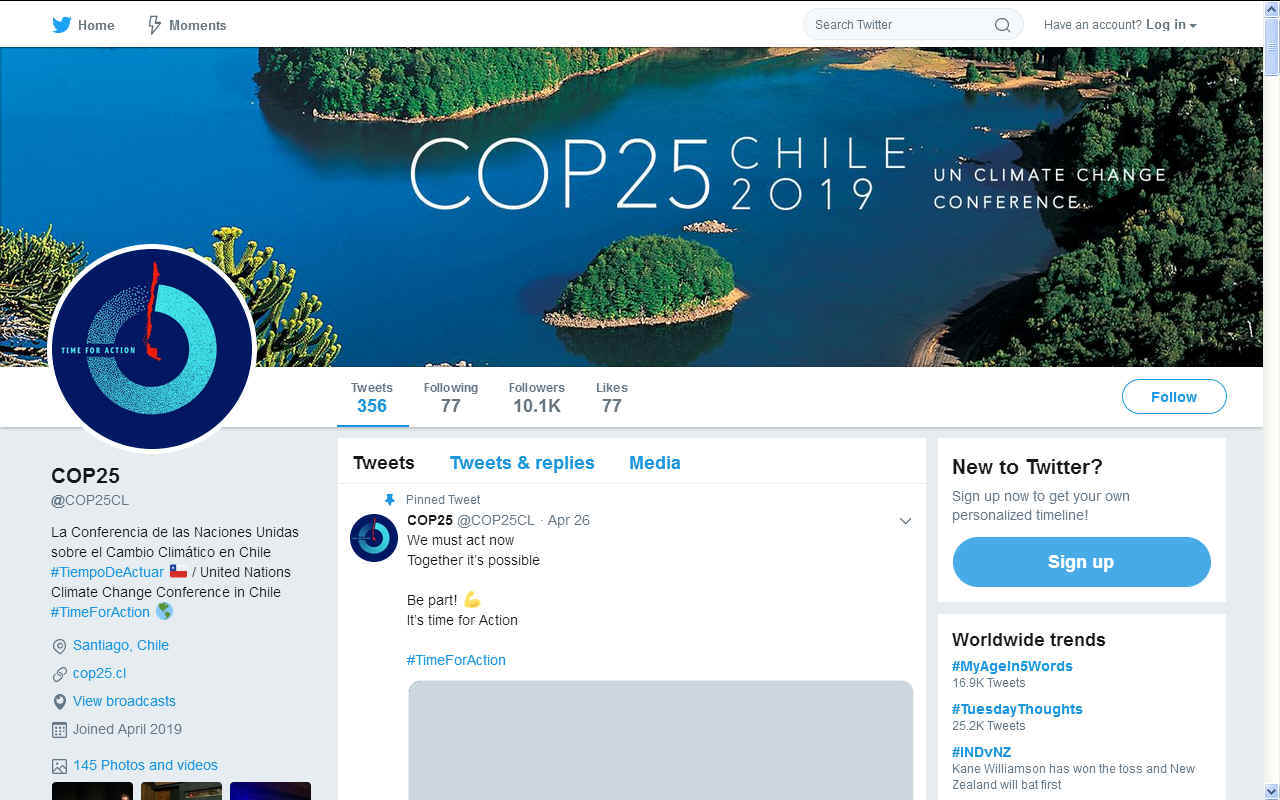
ENVIRONMENT MINISTER
Environment Minister, Carolina Schmidt, is a Commercial Engineer graduated at Chile’s Pontificia Universidad Católica. During President Sebastián Piñera first period (2010 – 2014), she served as Minister of the National Women’s Service and Minister of Education.
In August 2018, she became Minister of Environment with a clear purpose: the only way to achieve sustainable development is with care and respect for the environment.
She has a cross-cutting message: climate action and economic development do not move along separate tracks; on the contrary, it implies that the way to achieve a real sustainable development is the protection of the environment; in order to achieve this, adaptation and mitigation to climate change are essential.
One of her priorities is the incorporation of the gender perspective into public policies on environmental matters. She has pursued this initiative at the regional level, at the last Forum of Ministers of Environment of Latin America and the Caribbean; and at the global level, at COP24 in the United Nations Framework Convention on Climate Change.
She attaches great importance to multilateral agencies to solve global environmental problems; this is why in Poland, at the COP24, in an unprecedented action for a national secretary of state, Minister Schmidt took a leading role in global negotiations for the carbon market. Her commitment was such that she announced Chile as the host country for the COP25. “This is a huge challenge, which we take up as a historic milestone that will allow us to continue moving forward as a leading country in sustainable development and in our commitment to the environment,” she said.
Within the priorities of her administration, she is working intensely on the drafting of the Framework Law on Climate Change, the implementation of the Waste Management Law, the Extended Producer Responsibility and the Promotion of Recycling, the modernization of the Projects Environmental Evaluation System and the approval of the Draft Bill for the creation of the Biodiversity and Protected Areas Service, and the Draft Bill on Environmental Offences that seeks to prevent serious damage to the natural patrimony.
She expects through her convening role that these State issues will make progress regardless the administration in office, with the aim of promoting climate action as a cornerstone of State policies. 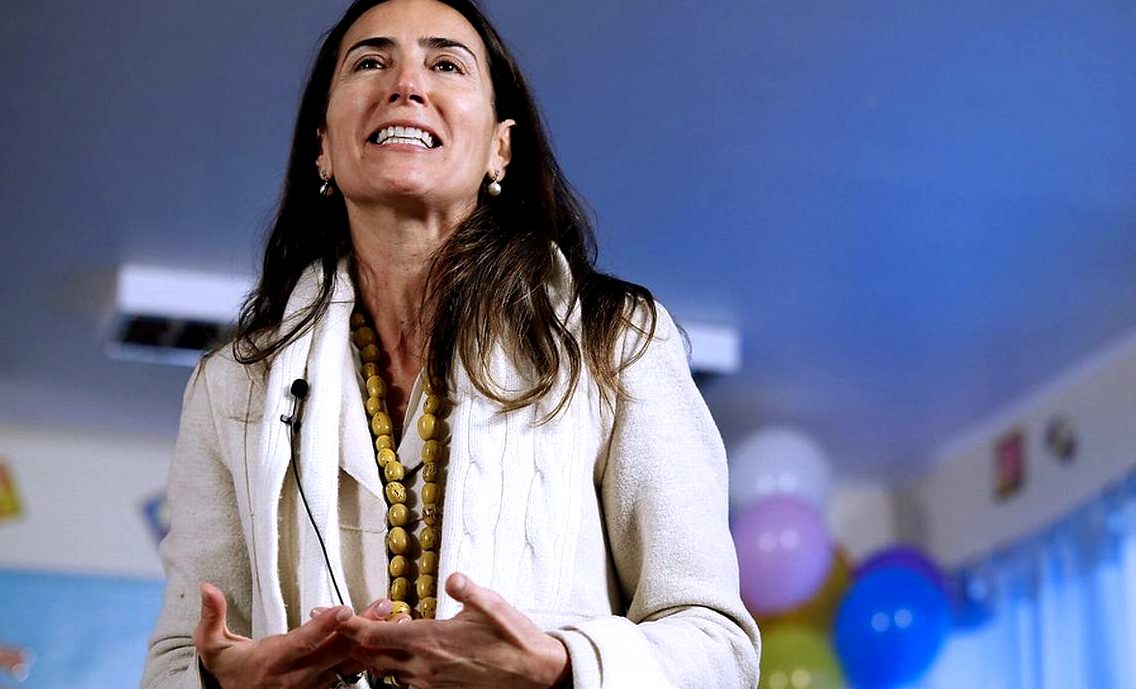
LATERCERA
- Ahora la iniciativa deberá cumplir su trámite en el Senado. En la instancia, la ministra de Medio Ambiente, Carolina Schmidt, manifestó que la realización de la Conferencia de las Partes en Chile, es un desafío económico y logístico, pero que "valdrá la pena, porque Chile es uno de los países más vulnerables ante el cambio climático".
Luego de que ayer pasara la prueba en las comisiones de Medio Ambiente y Hacienda, hoy la sala de la Cámara de Diputados aprobó -con 117 votos a favor y dos abstenciones- los recursos solicitados por el gobierno para financiar la Conferencia de las Partes 25 (COP25) que se realizará en Chile en diciembre próximo. La iniciativa fue despachada al Senado.
La cifra, que asciende a los US$ 35 millones, servirá para financiar parte de la cumbre internacional por el cambio climático. Pero además, se recibirán aportes internacionales y de organismos privados.
Es por esto que los parlamentarios solicitaron que desde el sector privado, los recursos no provengan de empresas a las que se le cuestiona su protección al medio ambiente.
En la sesión de hoy, la ministra de Medio Ambiente, Carolina Schmidt, que se encontraba presente durante el debate, manifestó que, “sin duda, ser sede de la COP25, el evento más importante del mundo, es un tremendo desafío. Un desafío económico, un desafío logístico, pero sobretodo es un gran desafío de convocatoria y unidad para generar consensos que nos permitan avanzar con más ambición en una lucha contra el cambio climático. Es un desafío mayor, pero es un desafío que vale la pena, porque Chile es uno de los países más vulnerables ante el cambio climático”.
Así, señaló que se trata de algo “imperioso” abordar la temática del calentamiento global. En ese sentido aseguró que la conferencia es una “oportunidad única” que servirá para “generar consciencia”.
La secretaria de Estado aseguró que para esto, es necesario involucrar a todos los sectores: ciudadanía, mundo científico, sector privado y el Estado.
La reunión se desarrollará en Santiago entre el 2 y el 13 de diciembre próximo, pero el lugar aún no está definido. El martes pasado, La Tercera dio a conocer una carta que envió Schmidt al buró de Naciones Unidas que está a cargo de la conferencia, para plantear que enero era una mejor fecha para emplazar la conferencia, sin embargo, esto fue desestimado por la ONU.
En la misiva, la secretaria de Estado además señaló que durante diciembre “el único lugar en Santiago que tiene los mínimos requerimientos para albergar la COP es Espacio Riesco, un lugar privado. Este es el lugar que se reservó para la Apec de noviembre de 2019, y está reservado en diciembre de 2019 para otros eventos privados, y por lo tanto, no disponible para la COP en
diciembre”.
VISION
The whole world is livinig a process of transformation towards a truly sustainable development. Raising the levels of ambition with a balance between mitigation and adaptation is essential. For this purpose, we need the participation of both the States and local governments, and the private sector.
The COP must encourage concrete climate action, ensuring an inclusive process for all parties and the formal integration of the scientific world and the private sector.
Our challenge is to achieve a transition towards increased action and that is perceived by the general public. Climate change is a reality now, not in 50 years’ time. 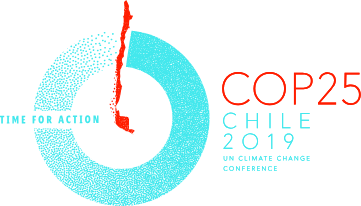
INNITIATIVES
While the COP25 is known as the “Time for Action” COP due to the need for all countries to expand their commitments to limit global warming, Chile wants to highlight the following topics.
Oceans
Oceans play a fundamental role in mitigating climate change since they capture and store more than 90% of the heat and approximately 25% of the carbon produced by emissions from human activities. Unfortunately, the increase in heat and carbon in the ocean is having visible, global impacts, and to a large extent, irreversible, such as the increase in temperature, sea level rise,
ocean acidification and changes in marine biodiversity, among others.
Antarctica
Antarctica, the Arctic and mountain glaciers (cryosphere), besides being major water reserves, are important climate regulators since they reflect the solar energy back into space and thus affecting the planet’s energy balance. The cryosphere is also very sensitive to
global warming, which leads to melting and loss of mass, processes that are (in part) responsible for rising sea levels, loss of biodiversity and deterioration of ecosystems. Alterations occurring in Antarctica (due to climate change) will have global consequences and will last for several centuries.
Biodiversity
The direct and indirect effects of climate change are closely related to changes in biodiversity resulting from human activity, so it is essential to ensure the preservation of biodiversity and its functions and allow for our development as a society.
Biodiversity is fundamental for the adaptation and mitigation of climate change, which is why it is necessary to carry out actions that enable its preservation.
In this context, Chile has not fallen behind; it has a wide network of land and marine protected areas and is carrying out a National Plan for Wetlands Protection and working on a Draft Bill for the creation of the Biodiversity and Protected Areas Service (SBAP).
Forests
Forests deserve special mention, as they play an important role in mitigating climate change by capturing and sequestering
CO2 emitted into the atmosphere. In addition, they provide a number of benefits, such as water provision, protection of soil and biodiversity in general. Chile boasts an extensive network of well-preserved native forest ecosystems, especially in the Patagonian zone. Nonetheless, in other parts of the country these ecosystems have been significantly altered and therefore their restoration must be a priority to mitigate climate change.
Adaptation
Estimations from climate change scenarios for Chile include increasing temperature, decreasing rainfall in the center-south and possible increases in farthest areas, and changes in glaciers surface area. These scenarios imply increasing extreme weather events and decreasing
water availability, having significant impact on ecosystems, population and productive activities. In order to cope with this impact, adaptation measures are required across sectors. The implementation of these measures must be focused on institutional improvements, design of resilient infrastructure, protection of ecosystems and less vulnerable communities.
Cities
The world is facing an unprecedented process of urbanization, which in Chile is particularly evident, with 90% of Chileans living in cities. The large size of cities makes them extremely complex, but trends of weak sustainability are seen in medium-sized and small settlements as well.
Cities contribute to climate change through the use of energy for transport, construction, housing operations and production processes, and are therefore vulnerable to the impacts of climate change.
On the other hand, local mitigation actions by the cities have the potential for an immediate impact which, when added together, can create global effects and local co-benefits such as reduced
air pollution.
With regard to adaptation, it is key for local and regional governments to integrate climate risks into their urban planning and management processes, in conjunction with the general public and service companies.
Renewable energies
Renewable energies are of the utmost importance for achieving sustainable development and for Chile’s ambition to be carbon neutral by mid-century, as they do not generate direct
greenhouse gases emissions (unlike fossil
fuels).
Chile has accomplished a rapid conversion to renewable energies without the need for direct subsidies. In fact, Chile leads Bloomberg’s Climatescope 2018 ranking as the most attractive country for the development of clean energies (out of a total of 103 emerging markets). Despite this, we are currently tapping only about 12 GW of our renewable energy potential, which exceeds 1,800 GW
Circular Economy
The fundamental principle of the circular economy is using waste as raw material for other products, drastically reducing both waste generation and the extraction of new and raw materials.
In February 2019, Chile passed a law banning the commercial use of plastic bags throughout the country. In addition, in 2016 the waste management framework law was passed, as well as extended producer responsibility and the promotion of recycling.
The country has a seal of circularity and initiatives aimed at reducing the use of plastic are being developed, such as the “Goodbye
plastic
straws” campaign.
Electromobility
Mobility in cities is a major source of greenhouse gases emissions, as well as many other externalities. To reduce them, we must think about urban planning aiming at shorter distances, prioritizing non-motorized modes and promoting public transport.
With regard to the latter point, electromobility represents a great opportunity if it goes along with renewable power generation. And it is especially attractive if the effort is focused on buses and urban trains. Santiago is moving forward decisively in this direction, extending its Metro network and implementing the world’s largest fleet of electric buses outside
China. 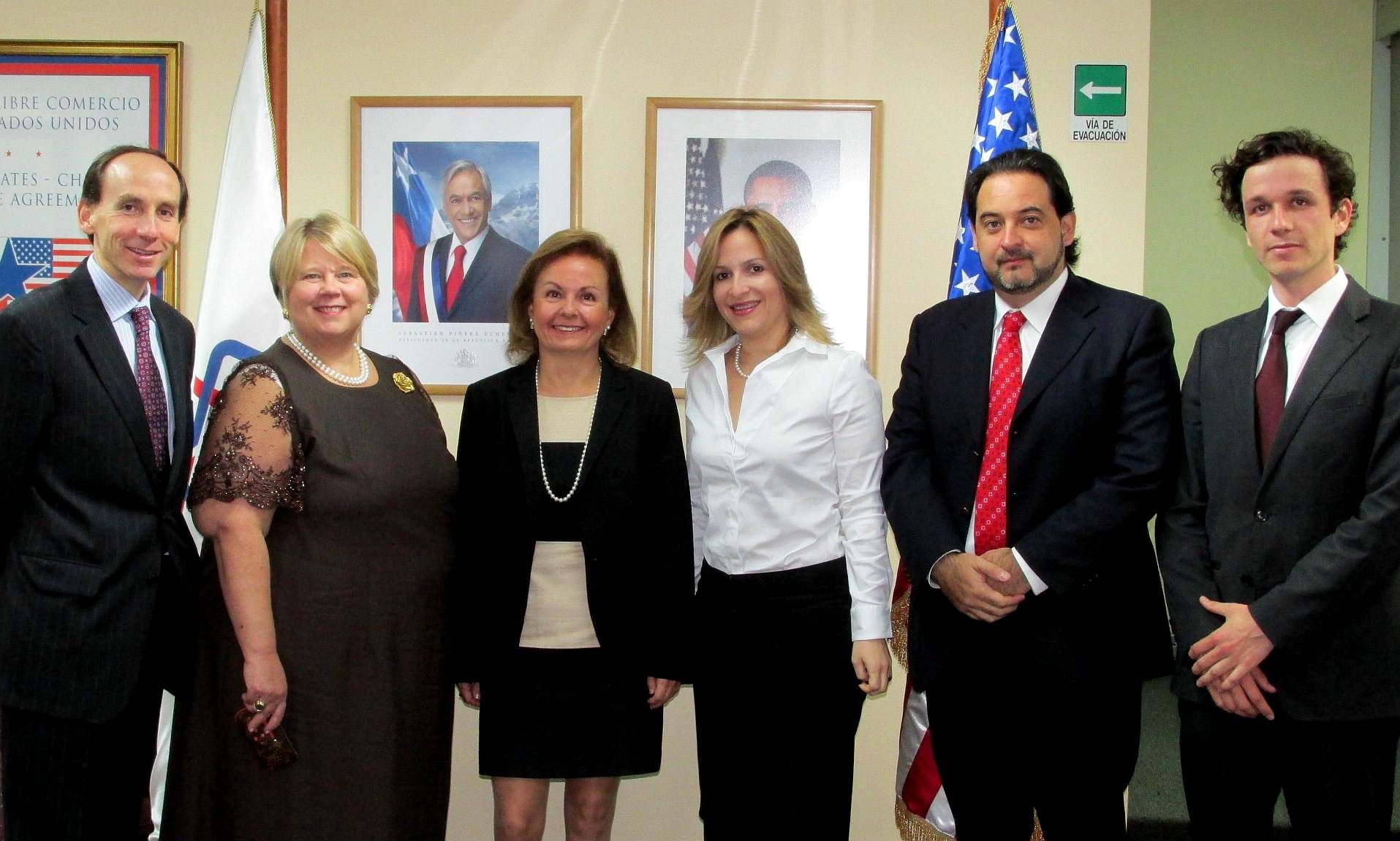
KATHLEEN
BARCLAY
- [2nd left] Prior to 2001, Kathleen Barclay developed her career for more than 23 years at Chase Manhattan Bank (now J.P. Morgan Chase & Co.), which included work in New York, London and Santiago. He led the corporate credit area for Latin America in the early 1980s; in addition to having been a director in the area of investment banking in London, working on bond issues and international advisory services for Latin America between 1988 and 1992. Between 1992 and 2000 she assumed the direction of the business of said financial institution in Chile, with emphasis on investment banking and international transactions. As Senior Country Officer, he represented the bank in several company directories through its Private Equity area. Under his direction, the bank was among the three leading firms in Chile in international mergers and acquisitions, capital markets and syndicated
loans.
On the other hand, Rodrigo Olsen, Content Coordinator COP25, presented in his presentation some insights of the accomplishment of the next summit of climate change, COP 25, which will take place in Santiago between December 2 and 13 next. "We are working on topics of interest, including the protection of oceans, glaciers, biodiversity, renewable energies and
circular economy, always with the purpose of accelerating development and uniting the private sector with the government, the scientific community and the rest of the involved actors, "he said.
Kathleen Barclay, leader of the AmCham Sustainability Committee, highlighted the accomplishment of the meeting in informing the members of the Chamber of the progress that is taking place as part of the preparations for COP 25 and announced that during the second semester, the agenda will continue with activities of this kind.
It is worth mentioning that COP 25 is one of the lines of work of AmCham for 2019, as well as APEC 2019 and the anniversary of the 15 years of the FTA with the
United
States. 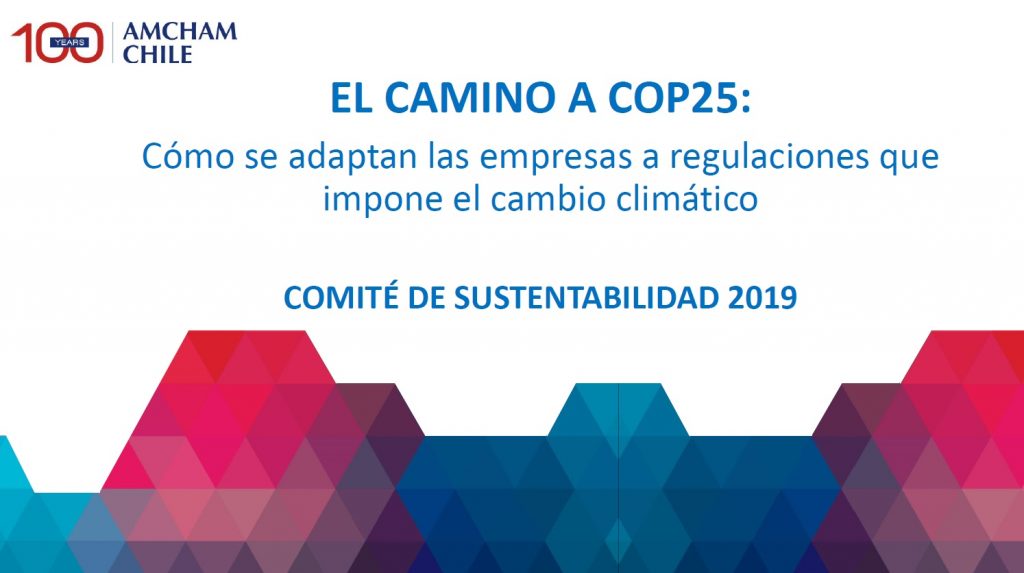
BUSINESS
INSIDER (REUTERS) 8 APRIL 2019 SANTIAGO
- Chile will urge countries at the United Nations
climate change conference in Santiago at the end of the year to adopt more ambitious commitments to deal with
global warming, President Sebastian Pinera told reporters on Monday.
The U.N. Paris Agreement was not strong enough "to prevent the world from continuing on a path that could end in tragedy," the president told a news conference.
"We will have to move forward so that countries assume more ambitious commitments," he said. The summit will be held on Dec. 2-13.
Chile, fronting the Pacific Ocean at the southern tip of South America, will also advocate for the protection of
Antarctica and the oceans, Pinera said.
(Reporting by Natalia Ramos; Writing by Hugh Bronstein; Editing by Sandra Maler) 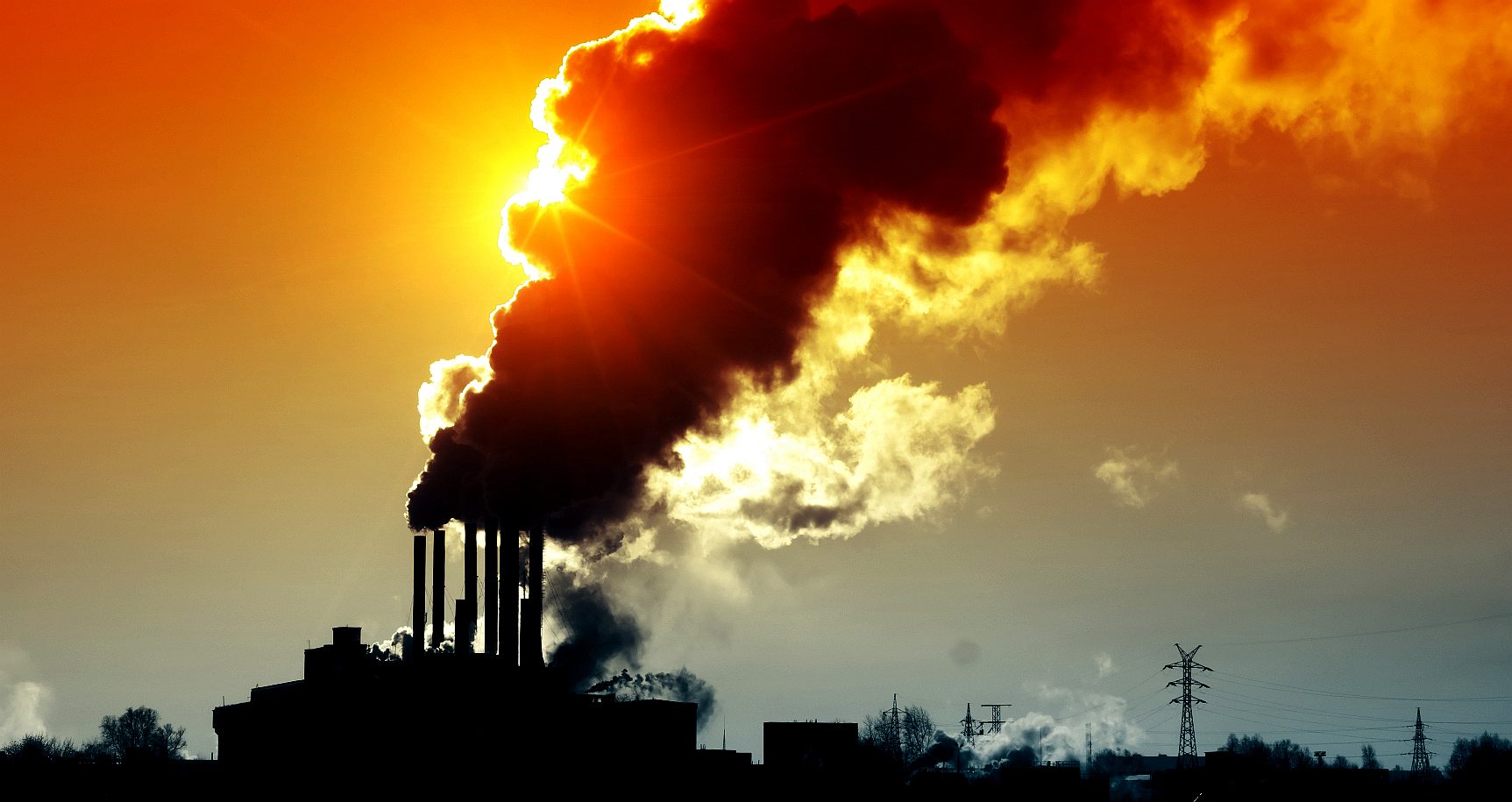
COP
HISTORY
|
1995
COP 1, BERLIN, GERMANY
1996
COP 2, GENEVA, SWITZERLAND
1997
COP 3, KYOTO, JAPAN
1998
COP 4, BUENOS AIRES, ARGENTINA
1999
COP 5, BONN, GERMANY
2000:COP
6, THE HAGUE, NETHERLANDS
2001
COP 7, MARRAKECH, MOROCCO
2002
COP 8, NEW DELHI, INDIA
2003
COP 9, MILAN, ITALY
2004
COP 10, BUENOS AIRES, ARGENTINA
2005
COP 11/CMP 1, MONTREAL, CANADA
2006
COP 12/CMP 2, NAIROBI, KENYA
2007
COP 13/CMP 3, BALI, INDONESIA |
2008
COP 14/CMP 4, POZNAN, POLAND
2009
COP 15/CMP 5, COPENHAGEN, DENMARK
2010
COP 16/CMP 6, CANCUN, MEXICO
2011
COP 17/CMP 7, DURBAN, SOUTH AFRICA
2012
COP 18/CMP 8, DOHA, QATAR
2013
COP 19/CMP 9, WARSAW, POLAND
2014
COP 20/CMP 10, LIMA, PERU
2015
COP 21/CMP 11, Paris, France
2016
COP 22/CMP 12/CMA 1, Marrakech, Morocco
2017
COP 23/CMP 13/CMA 2, Bonn, Germany
2018
COP 24/CMP 14/CMA 3, Katowice, Poland
2019
COP 25/CMP 15/CMA 4, Santiago, Chile (cancelled)
2019
COP25/CMP 15/CMA 4, Madrid, Spain
2020
COP 26/CMP 16/CMA 5, Italy
& UK bids |
SIX
STEPS TOWARD A COOLER PLANET
1.
TRANSPORT:
Phase out polluting vehicles. Government aims to end the sale of new petrol,
and diesel vehicles by
2040 but have no infrastructure
plan to support such ambition. Marine transport can be carbon neutral.
2.
RENEWABLES:
Renewable energy should replace carbon-based fuels (coal,
oil and gas) in our electricity, heating and transport.
3.
HOUSING:
On site micro or macro generation is the best option, starting with new
build homes.
4.
AGRICULTURE:
We need trees to
absorb carbon emissions from a growing population, flying, and to build new
homes. Reducing food waste and promoting less energy intensive eating habits
such as no meat Mondays.
5.
INDUSTRY:
Factories should be aiming for solar heating and onsite renewable energy
generation.
6.
POLITICS:
- National governing bodies need to adopt policies to eliminate
administrative wastages, to include scaling down spending on war machines,
educating the public and supporting sustainable social policies that mesh
with other cultures.
UN
CLIMATE ACTION PORTFOLIOS 1.
Finance
2. Energy
Transition
3. Industry
Transition
4. Nature-Based
Solutions
5. Cities and Local
Action
6. Resilience and
Adaptation
7. Mitigation
Strategy
8. Youth Engagement
& Public Mobilization
9. Social and Political
Drivers 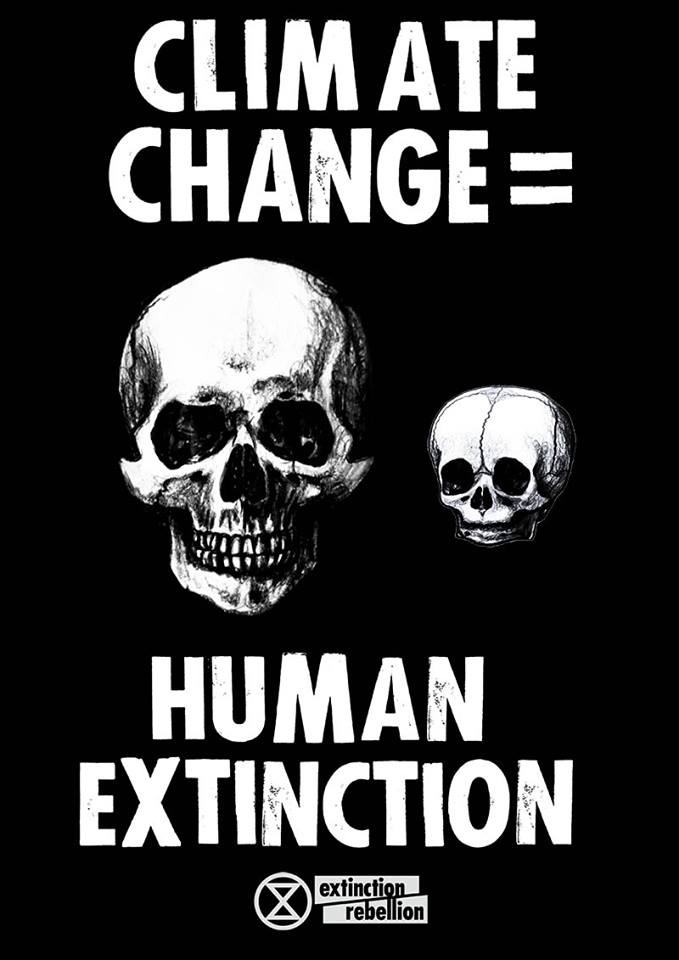
PROTESTS
- Extinction
Rebellion are a group of peaceful protestors who don't want mankind to
die out like the Neanderthals,
dinosaurs,
and many other species that humans are killing by burning fossil fuels and
their other nasty habits.
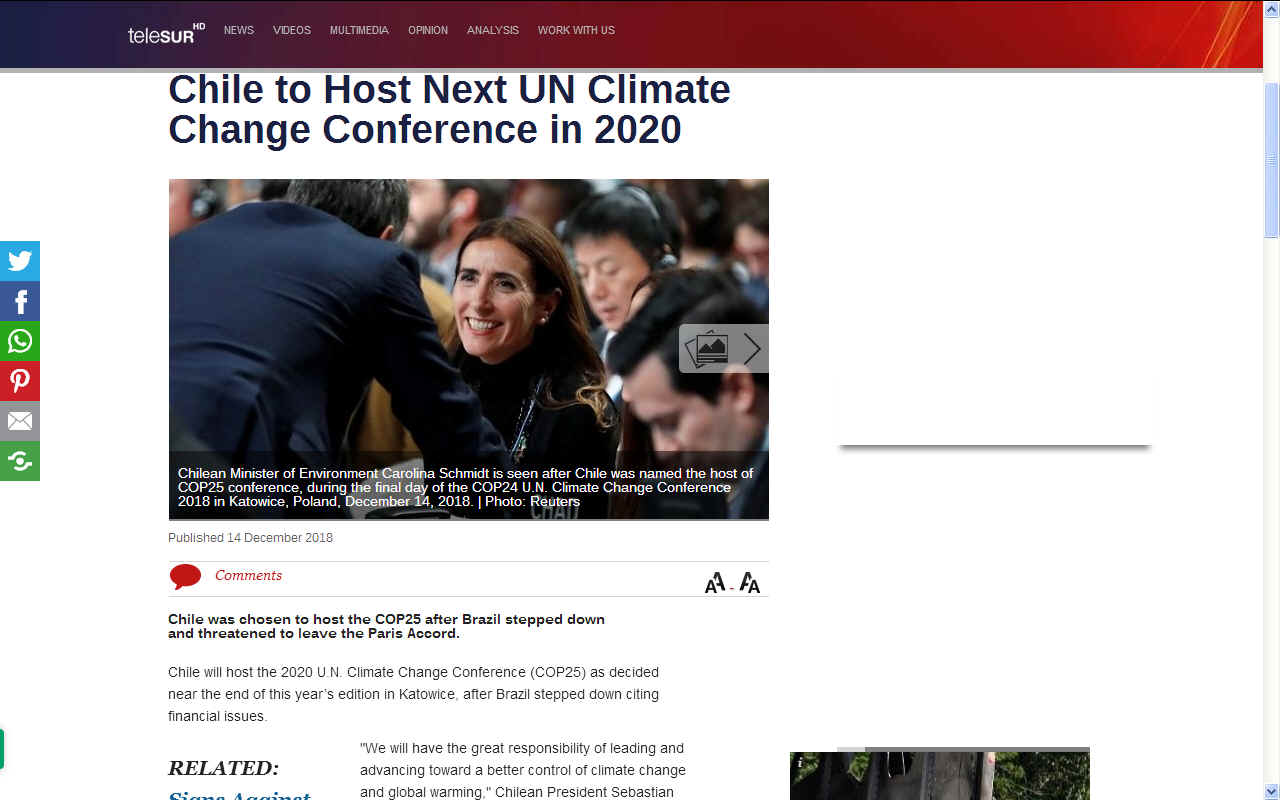
TELESUR 18 DECEMBER 2018
Chile was chosen to host the COP25 after Brazil stepped down and threatened to leave the Paris Accord.
Chile will host the 2020 U.N. Climate Change Conference (COP25) as decided near the end of this year’s edition in Katowice, after Brazil stepped down citing financial issues.
"We will have the great responsibility of leading and advancing toward a better control of climate change and global warming," Chilean President Sebastian Piñera told the press after the announcement.
The next summit was expected to take place between November 11 and 22, 2019, but Piñera said it will be in January 2020.
The rumors were first confirmed by Carlos Manuel Rodriguez, Costa Rica’s environment and
energy minister, speaking to EFE during the summit in Poland, and highlighted the importance for the summit to remain in Latin America after Brazil’s decision.
“Chile, Costa Rica and other countries in the region agreed to support Chile to host the COP25,” said Rodriguez.
Brazil withdrew its candidacy to host the 2019 COP25 conference citing budget limitations, but environmental groups understood the move as a favor to the incoming government led by the far-right Jair Bolsonaro, who has promised to pull out the South American giant from the Paris Accord on climate change.
Bolsonaro has also vowed to to remove restrictions on the agribusiness sector accused of causing untold devastation to the environment. In particular, the Amazon rainforest, and by appointing career diplomat Ernesto Araujo as his future foreign minister, a man who says that climate change is a plot by “cultural Marxists” and a “dogma” to promote the growth of
China.
Costa Rica was another strong candidate to host the summit, but it declined citing financial issues. However, the Central American country will still host a meeting in October previous to the summit, coordinating with Chile since the first months of 2019.
The summit takes place in a different region every year and Latin America is the next in line after this year’s summit in East Europe.
Rodriguez said that both Chile and Costa Rica have the “moral strength” to take the struggle against climate change “to the next level,” understood as “the full implementation of the
2015 Paris
Accord, aiming to limit the increase of temperature clearly below 2 degrees Celsius above pre-industrial levels.”
The election of Chile is important because the host country plays a key role as mediator and organizer in the negotiations - a complex multilateral process in which thousands of people from about 200 national delegations participate.
This year’s summit began on Dec. 3 and is taking longer than expected. According to the Polish Environment Minister Henryk Kolwaczyk, the discussions about the implementation of the Paris Accords will go on until Saturday.
The issues being discussed are current efforts by every country in their fight against climate change, and financial aid for climate policies while setting new objectives for 2020.
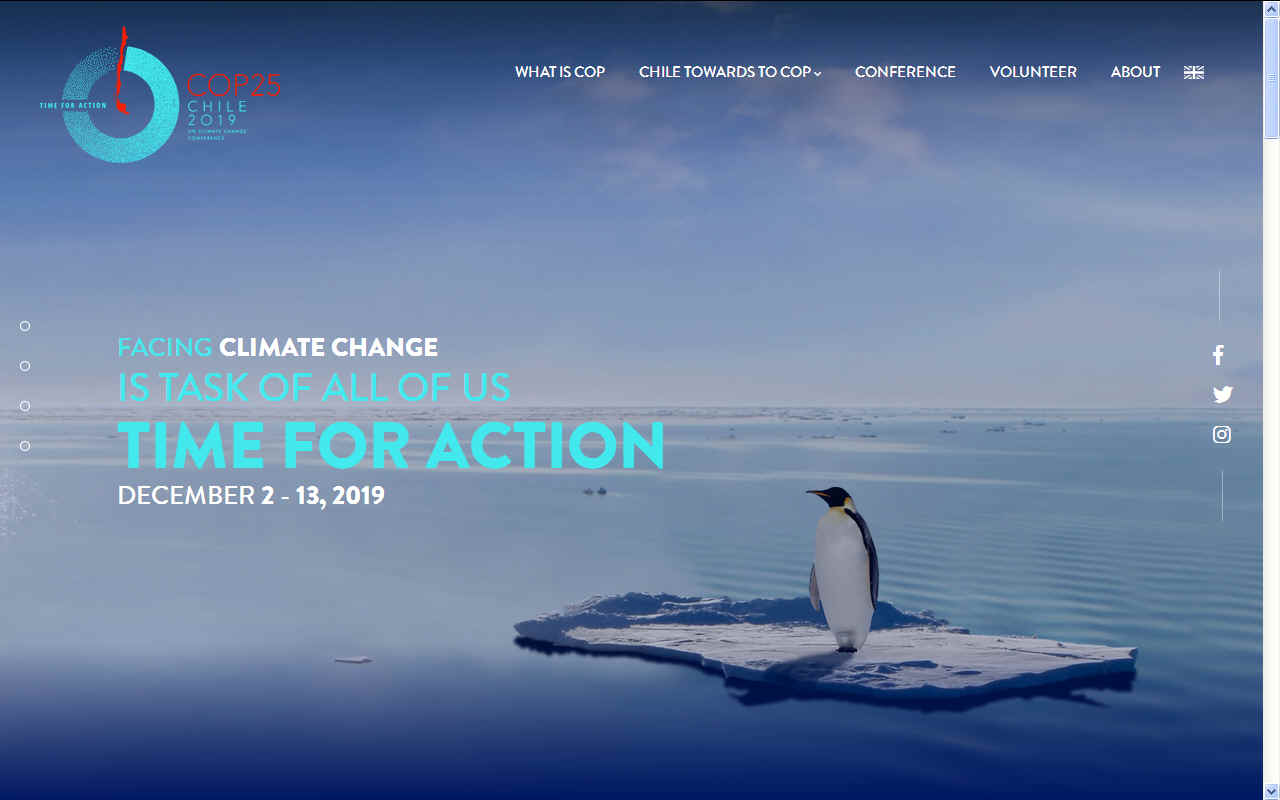
CLIMATE
CHANGE
- The United
Nations' climate summit talks are known as COP (= Conference Of the
Parties). During these discussions action for climate policy is
negotiated with each country fighting for points in a global economic
struggle. Nobody wants to give ground, except that every party agrees in
principle that they need to make concessions - otherwise, with deaths from heat
exhaustion and strokes, eventually, there will be nothing to argue about. We
will all be dead.
So far with
over twenty-four years of haggling the arctic ice is still melting - and
faster than ever. No wonder so many high profile people and corporations are
worried. The United Nations Framework Convention on Climate Change
(UNFCCC) is an international
treaty adopted at the Earth Summit in Rio de Janeiro from 1992. The UNFCCC objective is to "stabilize greenhouse gas concentrations in the atmosphere at a level that would prevent dangerous anthropogenic interference with the climate system".
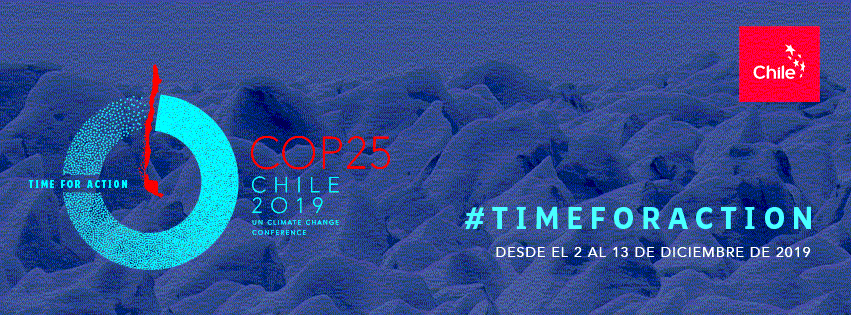
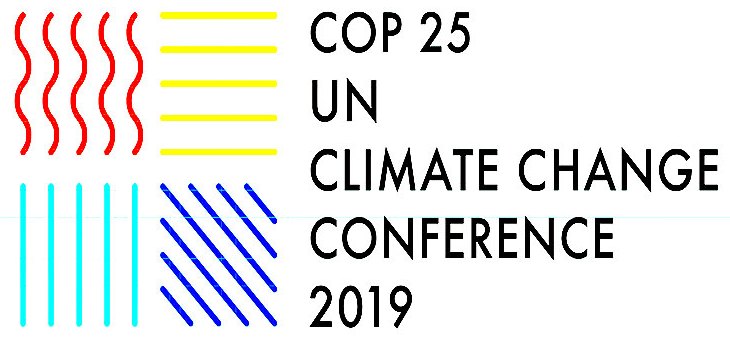
LINKS
& REFERENCE https://www.latercera.com/nacional/noticia/recursos-cop25-pasan-primer-paso-congreso-tras-aprobacion-camara-diputados/579855/ https://www.facebook.com/Cop25cl/ https://twitter.com/COP25CL https://www.cop25.cl/web/en/cop25-presidency-team/ https://www.amchamchile.cl/2019/06/encuentro-amcham-ahondo-en-implicancias-del-cambio-climatico-con-miras-a-cop-25/ https://www.telesurenglish.net/news/Chile-to-Host-Next-UN-Climate-Change-Conference-in-2020-20181214-0013.html
http://static4.businessinsider.com/chile-wants-more-ambitious-action-at-un-climate-change-conference-2019-4
|













